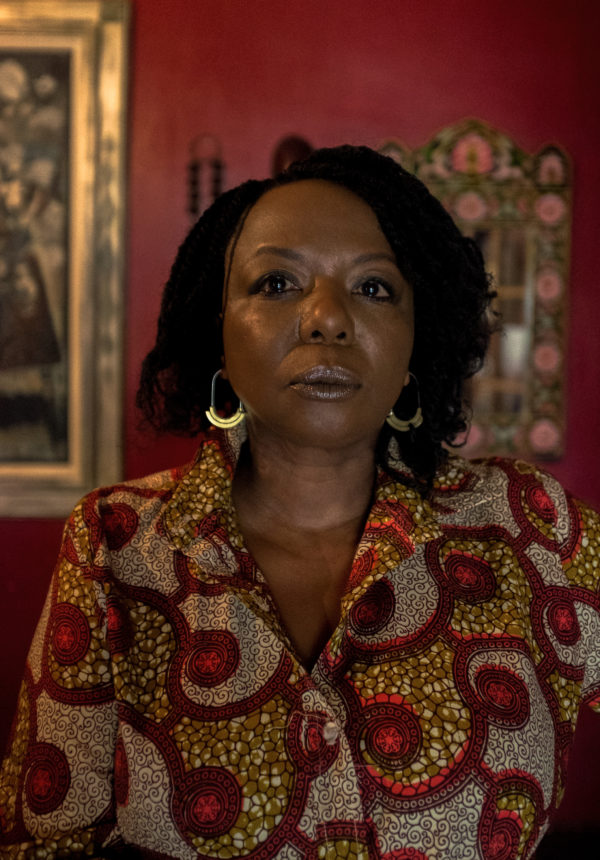
Brittle Paper‘s African Literary Person of the Year, now in its fifth year, recognizes individuals who work behind the scenes to hold up the African literary establishment in the given year. The 2019 Honour goes to Ellah Wakatama Allfrey, OBE, for being, in the course of more than two decades, a unique actualizing force in the African literary scene.
Wakatama’s galvanizing influence in contemporary Anglophone literature is incalculable. Her life is a long list of achievements, groundbreaking initiatives, and acts of advocacy for writers in an unforgivingly competitive industry. There is hardly any literary institution, Brittle Paper included, that has not been touched directly or indirectly by Wakatama’s generosity, industry, and intellect. The award recognizes the fact that the vibrant, beautiful thing that African literature is today would simply not be possible without Ellah’s contributions.
Born in Zimbabwe, then Rhodesia, in 1966, Ellah comes from a family of doers and creatives. Her father, Pius Wakatama, is a writer and publisher who sold copies of Drum magazine in the ’50s. For her first four years, Wakatama lived with her Shona grandparents; at six, her father having received the Iowa International Writers Fellowship, her family moved to the US, where she learned English; from 10 to 19, she was back in Rhodesia, and then returned to the US, from where, at 23, she moved to the UK. While in the US, she studied at Goshen College, where she edited the school newspaper and earned a BA in Journalism, and at Rutgers University, where she received an MA in Communication, Information and Library Studies. The constant travelling and switching between language would shape her relationship to culture and reading, her appreciation of language on a deep level, and her curiosity, all of which came in handy in her publishing career.
At the heart of Ellah’s many achievements is a fierce love for books. “My driving passion is the fact that I love books, I love writers, and more than anything, I love reading and want to bring writers and their work to as many people as possible,” she said, after being awarded an Officer of the Order of the British Empire (OBE), for services to the publishing industry. “I don’t think one could survive long in what is quite a tough industry without that as the base point. I think the kinds of writers and books I have been interested in, African writers in particular, means that I was not always working along with the mainstream. At times, that was a battle, but in the end I am pretty sure it was that interest, and the work I did with help from a lot of incredibly supportive colleagues, that led to this award.”
Wakatama’s impact on the literary world ripples across all facets of publishing. From the early years at Jonathan Cape where she worked with the likes of Julian Barnes, Ian McEwan, Bettany Hughes, Carmen Callil and commissioned Dinaw Mengestu and Evie Wyld, to her tenure as Deputy Editor of Granta Magazine, Wakatama has touched the lives of writers at all levels in their career. As a Senior Editor at Cape, The Bookseller credits her with being “responsible for Cape’s list of young African writers,” a list that included Brian Chikwava, Biyi Bandele, Peter Akinti, and Helon Habila. At Granta, she worked on 16 issues of the magazine, including the Best of Young British Novelists 4 while hosting podcasts with Binyavanga Wainaina and Taiye Selasi, among others. “She was a great asset, easy to work with, a good editor, and very widely read,” wrote Granta Editor-in-Chief Sigrid Rausing, in an email to Brittle Paper. “She worked hard to promote African writing whilst at Granta.”
Ellah is indeed one of the first global ambassadors of African literature, following the literary drought of the ’90s. For much of the 2000s, African literature continued to be a hard sell in the global literary market. There just wasn’t a lot of excitement around African writing. But Ellah helped to change things by using her position at powerful institutions to draw attention to the potential of African literature as a sustainable cultural trend and a market share. In 2014, she edited the decade-defining anthology Africa39: New Writing from Africa South of the Sahara, with a preface by Wole Soyinka. The Africa39 project, a collaboration between the Hay Festival and Rainbow Book Club to celebrate Port Harcourt becoming the UNESCO World Book Capital in 2014, aimed to identify “39 of the most promising writers under the age of 40 with the potential and talent to define trends in the development of literature from Africa and the African diaspora.”
In October of 2017, she became founding Publishing Director of The Indigo Press, an initiative by MILD Group. It was her first time leading a publishing press. She acquired three launching titles: the Zimbabwean-South African Panashe Chigumadzi’s nonfiction book These Bones Will Rise Again, the American Ivy Pochoda’s novel Wonder Valley, and the Eritrean-Ethiopian-British Sulaiman Addonia’s Silence Is My Mother Tongue. All three received critical acclaim. “She has made a huge contribution to the world of writing,” writes Susie Nicklin, CEO OF MILD Group, in her email to Brittle Paper—“as an editor supporting authors in shaping their works, as a moderator of literary events, as a judge of literary prizes, and as a champion of writing from around the world, especially from the continent of Africa.”
Ellah has also touched the lives of institutions and changed them for the better. The year she served as a Booker Prize prize judge, 2015, produced the first ever Jamaican winner of the prize in Marlon James. In 2013, she became a judge, and later chair, of the Miles Morland Foundation Writing Scholarship, an initiative that continues to be a life line for many writers on the continent. Earlier this year, she became the Chair of the Board of Trustees and of the Advisory Council of the Caine Prize in the institution’s 20th year. “She is a forceful personality whose informed and clear ideas and positions on publishing and African literature have been of great value to the growth of the Caine Prize,” writes Dele Fatunla, Administrator of the Caine Prize. He praises her “long-term dedication and commitment,” and notes that “through her work and influence, she has provided a model of leadership in the publishing world for many to admire and emulate.”
As Editor-at-large at the British publishing house Canongate, where she oversees fiction, she is poised to make more impact. “For over twenty-five years she has influenced, inspired and pushed forward the UK publishing industry,” says Canongate Publishing Director Francis Bickmore, who once described her as “the best of the best when it comes to commissioning and editing.” He is acknowledging. “It is an industry finally waking up to equality and diversity in 2020, but for twenty-five years Wakatama has been tackling the industry’s blinkered exclusivity first hand, shouting about the quality of the writers of colour she discovered, nudging the agenda in the right direction. Her passion for good writing and for championing the writers she cares about is unmitigated.”
Wakatama is popular among writers. Addonia shared the story of his novel’s acquisition by The Indigo Press. Feeling constricted by previous editors’ expectations, and having read some of the books Wakatama published at Jonathan Cape, he’d asked for a meeting with her following her indication of interest. “What happened afterwards restored my faith in publishing,” he told us. “I am not sure whether even Wakatama realises this but there is something about her that invites you to speak your truth.” He spoke his heart, making a case for the book he wanted it to be, while Wakatama took notes. “Her edits were incredibly targeted, precious, and every comment she made felt important that she showed me I was working with someone who was truly a writer’s editor. I am grateful to have worked with Wakatama with freedom. There is nothing more important to a writer than working with someone where you feel the truth of your book.”
“Ellah Wakatama Allfrey fights dirty, in the best way possible—refined, adept, disarmingly tender,” says the Liberian author Hawa Jande Golakai, a contributor to the Africa39 anthology. She is, Golakai says, “a good editor,” “a fine psychologist,” “a fine hostage negotiator,” and “a master at coaxing the best out of all writers in her care: the shy, the brazen, the heavy-handed, the weird. The hurt. We’re richly blessed to have her.”
The Nigerian memoirist Chike Frankie Edozien, a contributor to Safe House: Explorations in Creative Nonfiction, says Wakatama is “a magnificent unicorn. Wakatama sees me. She gets my stories. She needs little explanations or justifications.” But she is uncompromising, too. “Wakatama calls me on my shit. Without humiliation,” he says. “Her notes as she edits allow my writing to be truth. Heavy when it needs to be and light when it needs to be. It’s a joy and I’m constantly learning not just about craft, but about life. I love her.”
“To understand Ellah Wakatama’s spirit,” writes Chigumadzi, “you must understand the women who share her totem—vanaChihera. These are women who are known for their boldness and headstrong leadership. This is the spirit that has made Wakatama the boundary pusher that she is.” Chigumadzi continues: “Whether you encounter her work as a writer, editor, a publisher, prize judge, committee chair, it’s inevitable that you will be blown away by her razor sharp mind, generosity, and unwavering commitment to excellence. There are few people who have done so much to enrich our literatures as Wakatama has done.”
Annette Brook, Communications Manager of The Royal Society of Literature, where Ellah was inducted as an Honourary Fellow this year, sums up her impact. “She is fab, a champion of others, a force of nature in the publishing industry.”
See our previous African Literary Persons of the Year.




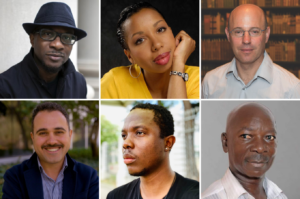
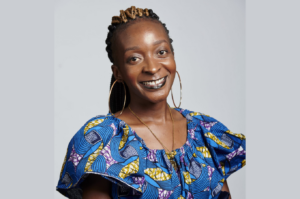
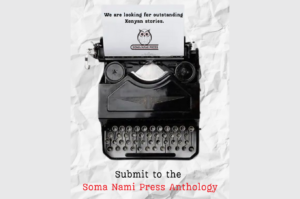
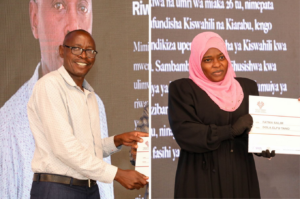

Scholarship and Mentorship Opportunity with Ellah P. Wakatama OBE (Open to Black British Writers) September 07, 2020 12:57
[…] Readers will recognize Wakatama as Chair of the AKO Caine Prize, 2015 Man Booker Prize Judge, and former deputy editor of Granta magazine and senior editor at Jonathan Cape, Random House. Wakatama was also named Brittle Paper’s African Literary Person of 2019. […]